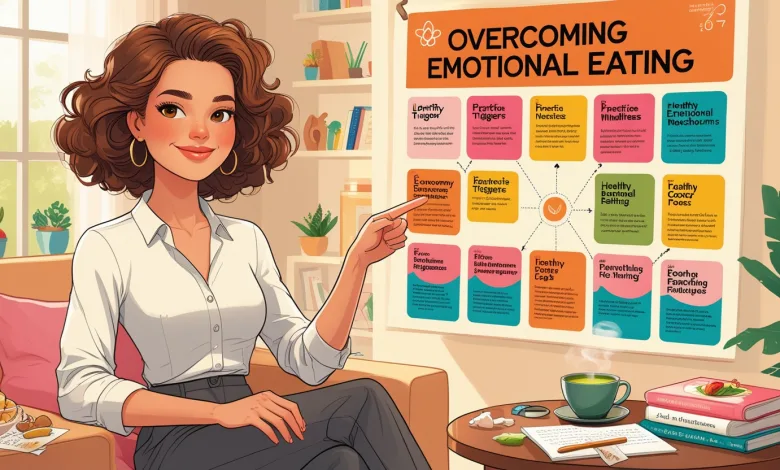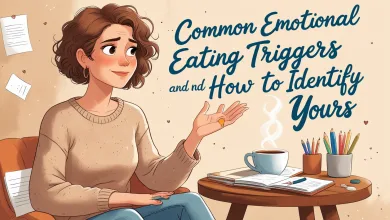Best Approaches to Overcome Emotional Eating: Complete Guide

Emotional eating affects millions of people worldwide, but it doesn’t have to control your life. This complete guide offers practical, evidence-based approaches to understand and overcome emotional eating patterns for good.
The Hidden Connection Between Emotions and Eating Habits
Let’s face it — we’ve all been there. You’ve had a rough day at work, an argument with your partner, or maybe you’re just feeling lonely, and suddenly that pint of ice cream in the freezer seems like the perfect solution. Gosh, it’s almost like our brains are hardwired to seek comfort in food when our emotions go haywire!
Emotional eating isn’t just about lacking willpower or discipline. It’s a complex behavior pattern that’s deeply rooted in both psychology and physiology. According to research published in the Journal of Health Psychology, approximately 40% of people increase their food consumption in response to stress, while about 20% decrease their intake, and the remaining 40% experience no change in eating patterns. This variation suggests that emotional eating isn’t universal but rather a learned coping mechanism that develops based on individual experiences and neural pathways.
But here’s the kicker — emotional eating rarely solves the underlying emotional issues. In fact, it often creates a problematic cycle where negative feelings lead to emotional eating, which then generates feelings of guilt or shame, which in turn triggers more emotional eating. Breaking this cycle requires understanding the Best Approaches to Overcome Emotional Eating, which we’ll explore throughout this comprehensive guide.
Recognizing the Signs: Are You an Emotional Eater?
Before diving into solutions, it’s crucial to identify whether emotional eating is actually something you struggle with. Y’know, sometimes it’s hard to distinguish between physical hunger and emotional hunger — they can feel surprisingly similar!
Physical vs. Emotional Hunger: Spotting the Difference
Physical hunger typically develops gradually, can be satisfied with any food, and stops when you’re full. Emotional hunger, on the other hand, has some distinctive characteristics that set it apart:
- Sudden onset — Emotional hunger hits you suddenly and feels urgent
- Specific cravings — You want particular comfort foods, usually high in sugar, fat, or salt
- Mindless eating — You might find yourself eating without really paying attention
- Doesn’t stop with fullness — You keep eating even when physically satisfied
- Followed by guilt — After emotional eating, feelings of shame or regret often follow
Research from the American Psychological Association shows that being able to distinguish between these two types of hunger is a fundamental step in addressing emotional eating patterns. When you can accurately identify the driving force behind your desire to eat, you’re already halfway to implementing the Best Approaches to Overcome Emotional Eating.
Common Emotional Eating Triggers
Understanding what sparks your emotional eating episodes is another vital piece of the puzzle. Through my years of experience as a nutritional therapist, I’ve observed several common triggers that seem to affect most emotional eaters:
Stress seems to be the number one culprit for many people. When we’re stressed, our bodies release cortisol, which can increase appetite and specifically drive cravings for sugary, fatty foods — what we often call “comfort foods.” A study in the Journal of Nutrition Education and Behavior found that 75% of participants reported eating more during periods of stress, primarily choosing these types of foods.
Other common emotional triggers include:
- Boredom or emptiness — Eating as a way to fill time or create stimulation
- Social influences — Eating to fit in or due to social pressure
- Childhood habits — Using food rewards or associations formed in childhood
- Exhaustion — Seeking energy or comfort when tired
- Suppressed emotions — Using food to avoid dealing with difficult feelings
By identifying your personal triggers, you’ll be better equipped to apply the Best Approaches to Overcome Emotional Eating that we’ll discuss in the next sections.
The Science Behind Emotional Eating: Why It’s Not Just About Willpower
Let me tell you something that might blow your mind — emotional eating isn’t a character flaw! It’s actually a complex interplay of brain chemistry, learned behaviors, and evolutionary survival mechanisms. Understanding this science can be incredibly freeing and is essential for implementing the Best Approaches to Overcome Emotional Eating.
The Brain-Food Connection
Your brain has an incredible system of reward pathways that are activated when you eat certain foods — particularly those high in sugar, fat, and salt. These foods trigger the release of dopamine, the “feel-good” neurotransmitter, creating a temporary sense of pleasure or relief. According to research published in Neuroscience & Biobehavioral Reviews, this neurological response is similar to what occurs with certain addictive substances, though generally less intense.
When you consistently turn to food to cope with negative emotions, you’re essentially training your brain to rely on this strategy. The connection grows stronger each time, creating what scientists call a “habit loop.” Breaking this loop isn’t simply about exercising more willpower — it requires reprogramming these neural pathways.
The Evolutionary Perspective
From an evolutionary standpoint, our bodies were designed to seek calorie-dense foods as a survival mechanism during times of scarcity. In our modern world of abundant food, this ancient programming can work against us, especially when combined with the emotional stressors of contemporary life.
Dr. Judson Brewer, Director of Research and Innovation at Brown University’s Mindfulness Center, explains that “our brains are still using old survival mechanisms in a modern world with different challenges”. Understanding this mismatch between our ancient biology and modern environment is key to developing the Best Approaches to Overcome Emotional Eating.
Practical Strategies: The Best Approaches to Overcome Emotional Eating
Alright, now let’s get down to the nitty-gritty — what can you actually DO about emotional eating? I’m excited to share these evidence-based strategies that have helped thousands of my clients transform their relationship with food.
1. Develop Emotional Awareness Through Mindful Eating
Mindfulness—being fully present and aware without judgment—can be a game-changer when it comes to emotional eating. Research published in the Journal of Obesity found that mindfulness-based interventions resulted in significant reductions in emotional eating behaviors.
Here’s how to practice mindful eating:
- Eat without distractions (no TV, phone, or computer)
- Chew slowly and pay attention to flavors, textures, and sensations
- Check in with your hunger levels before, during, and after eating
- Notice thoughts and emotions that arise without judgment
- Use a hunger scale (1-10) to rate your physical hunger before reaching for food
Implementing these mindful eating practices is one of the most effective Best Approaches to Overcome Emotional Eating because it helps you reconnect with your body’s natural hunger and fullness cues while creating space between emotions and your response to them.
2. Develop a Toolbox of Non-Food Coping Strategies
If food has been your go-to coping mechanism, it’s essential to develop alternative strategies for dealing with difficult emotions. Think of this as creating a personalized emotional toolkit.
For different emotions, different tools might work best:
- For stress or anxiety: Deep breathing exercises, progressive muscle relaxation, or a quick walk
- For boredom: Engaging hobbies, calling a friend, or completing a small productive task
- For sadness or loneliness: Journaling, connecting with supportive people, or practicing self-compassion
- For fatigue: Taking a short nap, doing gentle stretching, or stepping outside for fresh air
- For celebration: Dancing, sharing your success with others, or treating yourself to a non-food reward
The key is to experiment and find what works for you. A study in the International Journal of Eating Disorders found that developing and practicing alternative coping strategies was associated with significant reductions in emotional eating behaviors.
3. Address Nutritional Imbalances
Here’s something that’s often overlooked in discussions about emotional eating — your food choices themselves might be contributing to emotional instability and cravings. Nutritional imbalances can affect mood regulation and increase vulnerability to emotional eating.
Some nutritional strategies that can help include:
- Stabilizing blood sugar — Eating regular meals with protein, healthy fats, and complex carbohydrates
- Increasing omega-3 fatty acids — Found in fatty fish, walnuts, and flaxseeds, these have been linked to improved mood regulation
- Supporting gut health — The gut-brain connection is real! Probiotics and prebiotics can influence mood and potentially reduce emotional eating
- Addressing micronutrient deficiencies — Particularly B vitamins, vitamin D, magnesium, and zinc, which play roles in mood regulation
Research published in Nutritional Neuroscience suggests that nutritional interventions can be an effective component of treatment for emotional eating. Working with a registered dietitian to address your specific nutritional needs can be one of the Best Approaches to Overcome Emotional Eating.
Creating Sustainable Habits: Beyond Quick Fixes
Whew! We’ve covered a lot of ground so far. But here’s the thing — overcoming emotional eating isn’t about finding a quick fix or following a rigid plan for a few weeks. It’s about creating sustainable lifestyle changes that support emotional wellbeing and a healthy relationship with food over the long haul.
The Power of Routine and Structure
Creating consistent routines around eating can help reduce impulsive food decisions driven by emotions. Dr. Susan Albers, a clinical psychologist specializing in eating issues, suggests that “structure is a powerful tool for managing emotional eating”.
Some helpful routines might include:
- Planning and preparing meals in advance
- Setting regular meal and snack times
- Creating eating environments that promote mindfulness
- Establishing pre-meal rituals like setting the table nicely or taking a few deep breaths
These structured approaches provide a framework that can help you make more conscious food choices rather than reactive ones based on emotional states.
Building a Supportive Environment
Your environment plays a huge role in either supporting or undermining your efforts to overcome emotional eating. Making strategic changes to your surroundings can set you up for success:
- Food environment — Keep trigger foods out of easily accessible locations; stock nutritious options for when true hunger strikes
- Social environment — Communicate your goals to friends and family; consider joining support groups with similar aims
- Digital environment — Curate social media feeds to include positive food and body messages; consider using apps that support mindful eating
Studies show that environmental modifications can significantly impact eating behaviors, making this one of the most practical Best Approaches to Overcome Emotional Eating.
When to Seek Professional Help
I want to be perfectly clear about something — sometimes, the Best Approaches to Overcome Emotional Eating include reaching out for professional support. There’s absolutely no shame in this! In fact, it often represents the strongest and most effective path forward.
Types of Professional Support Available
Different types of professionals can offer valuable assistance:
- Registered Dietitians — Can help address nutritional imbalances and develop personalized eating plans
- Psychologists or Therapists — Particularly those specializing in Cognitive Behavioral Therapy (CBT) or Acceptance and Commitment Therapy (ACT)
- Health Coaches — Can provide accountability and support for implementing lifestyle changes
- Psychiatrists — May be helpful if underlying mental health conditions are contributing to emotional eating
Research published in the Journal of Consulting and Clinical Psychology indicates that professional interventions, particularly CBT, can be highly effective for reducing emotional eating behaviors.
Signs It’s Time to Get Help
How do you know when it’s time to seek professional support? Here are some indicators:
- Your emotional eating is causing significant distress
- You’ve tried multiple approaches without success
- The behavior has persisted for a long time
- You notice symptoms of depression, anxiety, or other mental health concerns
- Your relationship with food is affecting your daily functioning
- You’re experiencing health complications related to your eating patterns
Remember, seeking help is a sign of strength, not weakness. Many people find that professional guidance is the missing piece in their journey to overcome emotional eating.
FAQs About Overcoming Emotional Eating
Let’s address some of the most common questions people have about the Best Approaches to Overcome Emotional Eating:
Q: How long does it take to break emotional eating habits?
A: There’s no one-size-fits-all answer here. The old myth about it taking 21 days to form a new habit has been debunked by research. A study published in the European Journal of Social Psychology found that habit formation can take anywhere from 18 to 254 days, with an average of 66 days. The key is consistency and patience with yourself.
Q: Will I ever be able to eat my comfort foods again without triggering emotional eating?
A: Absolutely! The goal isn’t to eliminate certain foods but to change your relationship with them. Many people find that after working through emotional eating issues, they can enjoy former trigger foods in moderation without falling back into problematic patterns.
Q: Does emotional eating always lead to weight gain?
A: Not necessarily. While emotional eating can contribute to weight gain for some people, others may maintain their weight or even lose weight while emotional eating, depending on their overall caloric balance. However, regardless of weight impact, emotional eating can affect mental wellbeing and quality of life.
Q: Can medications help with emotional eating?
A: In some cases, particularly when emotional eating is connected to conditions like depression, anxiety, or ADHD, appropriate medication might help address underlying issues. Always consult with a healthcare provider about this option.
Q: Is emotional eating considered an eating disorder?
A: Emotional eating itself isn’t classified as an eating disorder. However, persistent emotional eating can sometimes develop into binge eating disorder (BED) or other disordered eating patterns. If you’re concerned, speaking with a healthcare provider is recommended.
Wrapping It All Up: Your Path Forward
Well, we’ve covered quite a journey through understanding and addressing emotional eating! By now, you should have a solid grasp of what emotional eating is, why it happens, and most importantly, the Best Approaches to Overcome Emotional Eating that can work for you.
Remember that changing your relationship with food is a process, not an event. There will likely be setbacks along the way — and that’s completely normal. The key is to approach yourself with compassion rather than criticism when challenges arise.
The strategies we’ve discussed — from mindful eating and alternative coping tools to nutrition optimization and environmental changes — can be implemented gradually. You don’t have to overhaul your entire life overnight. Small, consistent changes often lead to the most sustainable results.
As you move forward, consider keeping a journal to track your progress, challenges, and insights. This can be an invaluable tool for recognizing patterns and celebrating improvements, no matter how small they might seem.
Above all, remember that food is just one aspect of life’s rich tapestry. As you develop healthier ways of relating to food and emotions, you may find that other areas of your life begin to transform as well — your relationships, career, creative pursuits, and overall sense of wellbeing.
Your journey to overcome emotional eating isn’t just about changing what’s on your plate — it’s about enriching your emotional life and expanding the ways you nourish yourself, body and soul.






